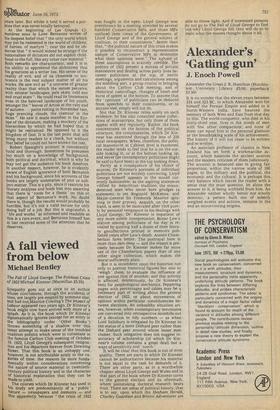Alexander's 'Gaffing gun'
J. Enoch Powell
Alexander the Great .1, R. Hamilton (Hutchinson University Library £3.00; paperback £1.50)
It is no wonder that the eleven years between 334 and 323 BC, in which Alexander won for himself the Persian Empire and added to it North-Western India, have haunted the memory of both West and East from that day to this. The world-conqueror, who died in his thirty-third year, lives in the minds of men with few other companions; and none of them can equal him in the personal glamour or the breathtaking scale of his achievement. The history of it will not cease to be written and re-written.
An associate professor of classics in New Zealand has set forth a workmanlike account, which balances the ancient sources and the modern criticism of them judiciously. The account is balanced also in giving fair proportion, within the narrow scale of 166 pages, to the military and the political, the economic and the cultural. It is perhaps this, very balance which leaves the reader with a sense that the main question, let alone the answer to it, is being withheld from him. An Alexander neither wholly heroic nor wholly demonic, a person built out of soberly weighed events and actions, remains in the end an unconvincing enigma. How could it happen? The problerh, however ineffectual our attempts at a solution, cannot be suppressed: the stupendous character of the Alexander episode forces it into the open.
In searching for some sort of parallel or comparison one comes involuntarily upon the Spanish conquest of the empires of the New World. There is not, it is true, a single supereminent commander-figure. Yet there is an important similarity, beyond the simple disparity, in both cases, between the apparent means and the•results achieved. It is the invincibility of the aggressor — not merely as perceived by hindsight, but as held to be a self-evident certainty in advance.
In all the great historic careers of conquest the victor has exploited some tactical or technical device without which all the genius of strategy and leadership would not have produced the glittering series of victories. Yet a Cromwell or a Napoleon, a Caesar or a Charles XII, are all seen in travail, wringing — and not always wringing — the hard-won reward from their peculiar asset, so long as its efficacy lasted. With Alexander, as with Cortez, one always feels that " we have got The Gatling gun, which they have not."
It is easy enough to identify the ' Gatling gun' of the conquistadores; but what was Alexander's? One's suspicion is that it lay not so much in the human as in the technical. No technically superior weapon yields its poten tial except in the hands of those fitted by mo rale, training and self-confidence to exploit it to the full; and no doubt the Macedonian soldiery, tempered in Philip's incessant wars against both barbarians and Greeks, was such a military vehicle, But still, what was the weapon itself?
The traditional answer is: the phalanx, a 'queen of the battlefield' such as the tank momentarily proved itself to be in the German Panzerkrieg of 1940-42. The set-piece battles of Alexander's triumphant progress do not, however, fully bear this out. The answer seems rather to be: the phalanx plus some-. thing else; and that something else seems to be the heavy cavalry. This comes out particularly clearly at the culminating battle of Gaugamela, where Alexander was outnumbered five to one in cavalry but used his 2,000 horse guards (' Companions ') as the decisive weapon.
Along this line of thought we reach a tentative solution, or at least a promising standpoint from which to contemplate the phenomenon of the Alexander saga. A unique tactical and technical machine, which retained its uniqueness throughout the brief episode, found itself in the hands of a fine army and a commander of natural genius. Alexander was, from first to last, ' the man behind the gun . He was superbly in tactical control of it; yet what he was in history was what the weapon made him, and every act of his life was in the service of the instrument which fate had given him and whose insatiable appetite he fed till overtaken by a premature death.



































 Previous page
Previous page